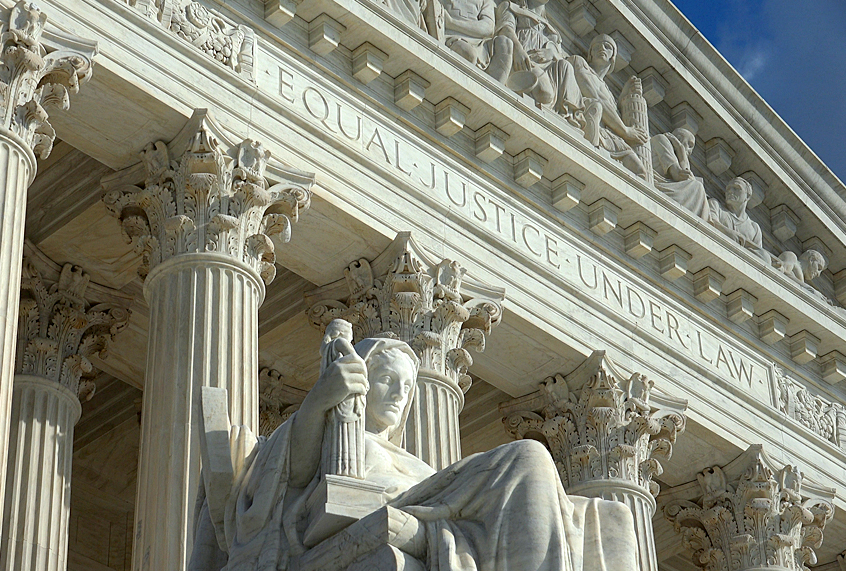The U.S. Supreme Court on Monday upheld Ohio’s aggressive efforts to purge its voter rolls – a practice that voting rights advocates and civil rights groups say discourages minority turnout.
In a 5-4 decision, the court’s majority ruled that a state may remove people from their voter registration lists if they fail to cast a ballot during a two-year period and to respond to a notice from state election officials. People who do not respond to the notice and don’t vote during the next four years, including in two or more federal elections, are removed from the list of registered voters.
The practice, known as the “supplemental process,” does not violate the National Voter Registration Act, which says voters can be removed from the rolls only if they ask, move, are convicted of a felony, become mentally incapacitated or die, the court said. It is one of two methods federal election officials use to identify voters who are no longer eligible to vote due to a change of residence.
The court’s five conservative justices voted in the majority, with the court’s four liberals dissenting.
In delivering the majority opinion, Justice Samuel Alito said the court’s job was not “to decide whether Ohio’s supplemental process is the ideal method for keeping its voting rolls up to date. The only question before us is whether it violates federal law. It does not.”
Justice Stephen Breyer issued a dissenting opinion, which Justice Ruth Bader Ginsburg, Sonia Sotomayor and Elena Kagan — the liberal wing of the court — joining. Instead of focusing on inaccurate voter rolls, he recalled the history of literacy tests, poll taxes and other requirements he said were created to “keep certain groups of citizens from voting.”
Breyer noted that most registered voters fail to respond to the state’s “last chance” notices, which leaves their failure to vote as the root cause for being removed from the registration lists. The number of registered voters who do not vote and do not respond to the notices exceeds the number who actually have moved, he argued.
“The streets of Ohio’s cities are not filled with moving vans; nor has Cleveland become the nation’s residential moving companies’ headquarters,” Breyer said. Rather, Ohio’s process “erects needless hurdles to voting of the kind Congress sought to eliminate.”
Justice Sonia Sotomayor agreed with Breyer, arguing that Ohio’s statistics show that the state’s “purge program” disproportionately affects minority, low-income, disabled and veteran voters.
“This purge program burdens the rights of eligible voters,” she said. “At best, purged voters are forced to needlessly reregister if they decide to vote in a subsequent election; at worst, they are prevented from voting at all because they never receive information about when and where elections are taking place.”
The ruling could be a major victory for Republicans, who tend to benefit when voter turnout is low, and a loss for Democrats, who tend to benefit from high-turnout races.
In his since-dissolved Voter Fraud Commission, President Donald Trump signaled a desire to take action on voter roll maintenance. In January, Trump said messy registration lists are an indication of fraud and must be examined.
“When you look at the people that are registered — dead, illegal and two states and some cases maybe three states — we have a lot to look into,” Trump told ABC News.
The issue before the Supreme Court concerned Larry Harmon, a software engineer and U.S. Navy veteran who lives in Akron, Ohio. He voted in the 2004 and 2008 presidential elections but did not vote in 2012. The Ohio resident also sat out the midterm elections in 2010 and 2014. In 2015, Harmon did want to vote against a ballot initiative to legalize marijuana but learned that his name had been purged from the voting rolls.
All states have procedures for removing from their registration lists the names of people who have moved and are thus no longer eligible to vote in a given precinct.
Six other states — Georgia, Montana, Oklahoma, Oregon, Pennsylvania and West Virginia — have similar “use it or lose it” practices of cleaning up their voter rolls, but Ohio’s rules are by far the most aggressive in the nation.
“At least a dozen other politically conservative states said they would adopt a similar practice if Ohio prevailed, as a way of keeping their voter registration lists accurate and up to date,” NBC News reported.


